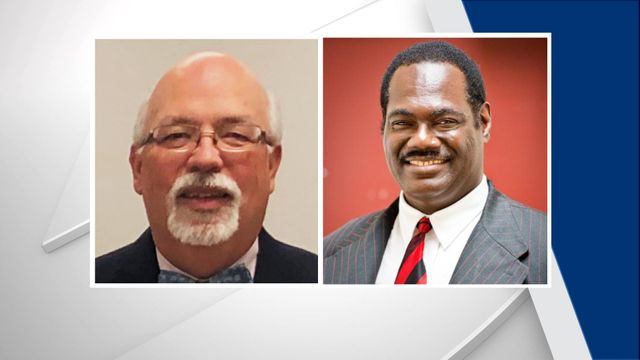State Board of Elections' only two Republicans resign after absentee ballot lawsuit settlement drops
Surprise resignations hit a month and a half before the 2020 elections.
Posted — UpdatedKen Raymond and David Black were the only two Republican members on a board that has been split 3-2, with Democrats in control. Notice of their resignations went out shortly after 10 p.m.
"It is impossible to have true bipartisanship when both sides of the political aisle do not have the important and vital information needed to make the right decisions," Raymond said in his letter.
In a statement Thursday morning, Stein called the resignations "political theater at its most destructive."
"The Republican Party needs to start respecting democracy, instead of undermining it," he said.
Republican Lt. Gov. Dan Forest, meanwhile, fired off a letter to U.S. Attorney General William Barr, asking for a federal investigation into "the collusive attack on the integrity of North Carolina's elections."
"The fact that an executive agency would dare enter into an agreement that attempts to make substantial changes to our election law less than six weeks before the election raises serious concerns about the motives of all involved. It also raises serious legal concerns," Forest wrote.
State Board Chairman Damon Circosta said in his own statement Wednesday night that the accusations raised by the two GOP members weren't true.
"In a nearly three-hour meeting and in extensive briefings prior to the meeting, all board members were provided with the merits, both pro and con, of settling these lawsuits," Circosta said.
Board spokesman Patrick Gannon also addressed the complaints in a statement announcing the two resignations.
"The agency’s legal staff, who are civil servants, provide thorough legal memos to the board prior to every board meeting and answer any questions board members have about matters that come before the board," he said.
State law requires that signature, and without it a voter must cast another ballot to have his or her vote count. The proposed settlement ,also known as a consent order, would change that to let the voter sign an affidavit, forgoing the witness signature.
"It was not my understanding that the cure would simply mean an affidavit, or cure document, would be sent to the voter for a confirmation that this ballot was their own," Black said in his resignation letter.
"The proposed consent order is a negotiated compromise response to the greatest public health crisis in 100 years, the USPS slowing of mail delivery, and a federal court order mandating a cure process for mail in ballot errors," the attorney general said in his statement.
In his letter Wednesday, Black also complained of other policy decisions at the board and said he tried to "make sensible decisions while knowing that the vote most likely would end up 3-2."
"These recent decisions have made it untenable for me to remain as member," he wrote.
The proposed settlement is not final. It must still be accepted by the court, and Wake County Superior Court Judge Bryan Collins plans an Oct. 2 hearing on the matter. There's also a hearing in the suit Thursday, on a different matter, but the settlement may be discussed.
In addition to the witness signature change, the settlement would require the state to count ballots that are postmarked by Election Day, but don't arrive until Nov. 12. State law currently requires them to arrive by Nov. 6, and lawmakers declined to extend the deadline further when they reworked the state's absentee ballot rules earlier this year in reaction to the coronavirus pandemic.
The settlement would also let people drop their absentee ballots off curbside at local election offices without signing a logbook, fueling criticism that ballot harvesters will take advantage. State law generally forbids anyone other than a voter or close relative from handling a ballot, and North Carolina overturned a congressional election last year because of ballot harvesting.
Absentee ballots can also be mailed, though the same rules for ballot handling apply.
Republican leaders in the General Assembly have promised to fight the proposed settlement, and they issued angry statements when it was announced. Among other things, they accused Stein and Gov. Roy Cooper of colluding with national Democrats who brought the lawsuit in a plot to change North Carolina's absentee voting rules after nearly a million ballots have been sent out to voters.
The case that triggered the resignations was brought by an attorney for national Democrats named Marc Elias, who is arguably his party's most prominent attorney on election law.
It's not clear whether state Republican leaders asked Black and Raymond to resign. Black declined to say or to comment further in a brief phone call Wednesday night. A state party spokesman declined comment.
Black told WRAL News Tuesday that settling had seemed like the right option. He said in his resignation letter that the Attorney General's Office, which represents the state board and other agencies in court, told board members that "the likelihood of prevailing in court would be slim."
Raymond did not answer WRAL's calls or return messages Tuesday or late Wednesday. In his letter, Raymond said board members were led to believe several things, including that "the effective administration of the election itself rested upon a settlement."
The North Carolina Republican Party will forward a list of three nominees to Cooper for each vacancy, and Cooper will pick the replacements. The timing on that was not immediately clear late Wednesday.
Circosta, the current chairman, also heads the A.J. Fletcher Foundation, which was started by the founder of Capitol Broadcasting Company, which owns WRAL. Capitol Broadcasting leadership sits on the foundation board.
The board is currently part of a number of lawsuits dealing with election law, most of which aren't likely to affect this election. Some may, though, and the board agreed to settle roughly half a dozen of them last week.
Related Topics
• Credits
Copyright 2024 by Capitol Broadcasting Company. All rights reserved. This material may not be published, broadcast, rewritten or redistributed.





